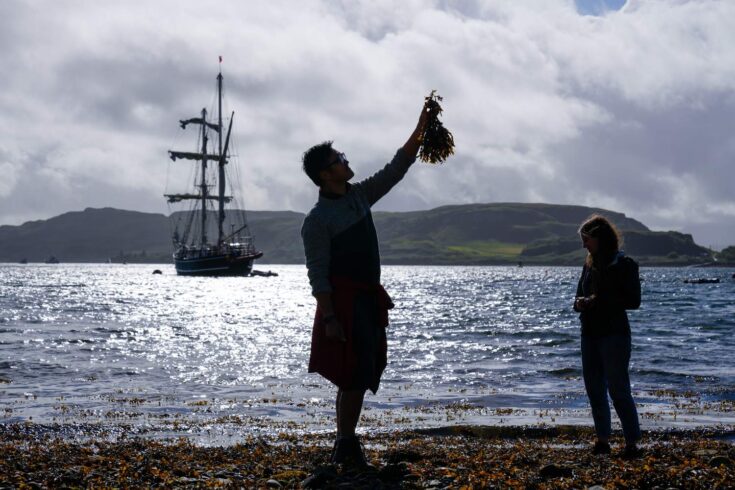The Highlands and Islands Climate Change Community Grant scheme, funded by UK Research and Innovation and delivered by the British Science Association and Science Ceilidh is designed to explore what a more participatory, place-based small grants scheme could look like.
The aim is that community groups who have fewer opportunities to engage with research, are able to lead partnerships with researchers on climate change projects.

Highlands and Islands Climate Change Community Grants project cohort on a Zoom call. Credit: British Science Association
The importance of building ‘communities of practice’
We wanted this scheme to take a relationship-focused approach throughout, providing projects with both ‘on the ground’ engagement and strategic support. In order to draw on local expertise in the decision-making process, local Highlands and Islands stakeholders have been involved throughout the process – from helping spread word of the opportunity to groups often underrepresented in research, to being part of the community-based grant review panel. Projects who came into the process with climate ideas but no existing connection to researchers were provided with appropriate support to have conversations and be matched based on their own needs.
One of the most important elements of the support is regular convening of projects through a ‘community of practice’ even within the relatively short (six month) grant period. These sessions provide space for the group to connect, share candidly how things are progressing, and work through specific issues together. They are designed to recognise the diverse expertise within the group – lived, academic and professional – and allow everyone involved (communities, researchers, facilitators, and funders) to learn and adapt as we go along. In our last session, for example, we shared different creative ways to reach more local people and engage beyond the ‘usual suspects’ who already take part in climate change activities. We also refined shared evaluation questions together. This ensures we are able to evaluate the impact of the whole programme rather than only on the individual project level – something which was identified within the group as important.
These sessions are also an opportunity to build connections between projects. Though it’s always a balance around the time commitment involved, members have remarked about how useful it is to have a space for reflection and already we see a few connections being made. Hopefully this can continue to support meaningful relationships across the region beyond the lifespan of the funded projects. Together, these help us move towards a more networked approach to climate change – a fundamentally systemic challenge – drawing shared themes and intersecting issues from a diverse set of projects.
Flexibility required in supporting communities to value ‘process over project’
Each of the 10 groups were deliberately selected to be at different stages in their ‘climate journeys’ and experiences of working with researchers. Through the process and matching, this has led to many different ways of the community and researchers working together. Some projects are training community members to be peer-researchers, while others have taken a more citizen-science-based approach to trial new interventions, whether it is improving local soils with algae or exploring what a net zero school run might look like.
These intersecting issues are clearly demonstrated through challenges that tie acutely to the current global context. Recently, rising fuel costs have been particularly keenly felt in more rural communities and have put significant unanticipated strains on project budgets for many of the projects. Similarly, COVID-19 and its legacy in the Highlands and Islands continues to affect projects, reducing staffing and capacity of organisations and stakeholders, including schools, businesses, volunteers and universities, to be able to respond to new ideas. There is a shared feeling that for many of the groups – whether small with only a few staff members, most common in our portfolio, or larger ones alike – maintaining basic essential services is difficult enough in the current financial climate.
In response, we have continued to stress that flexibility is important to support the groups as they evolve and navigate challenges. We’ve focused on the ‘process over project’ – an appreciation that things will change in a community-led project, and that the adaptations and subsequent learning are more important than sticking to a rigid project plan. Ultimately, as one participant raised in the community of practice, these emerging issues highlight how climate action cannot be seen in isolation. ‘A Just Transition’ must recognise how these intersect with the economy, health, and other inequalities.
Despite the challenges there has continued to be a buzz of excitement in our meetings. Updates have included project launches, community training events, researchers and community partners meeting in-person after months of planning online, and activities with local participants going ahead (many linked in with the Highland Climate Festival) and being picked up by the local press.
What’s in store for the future of the scheme
We’re now focusing on the ‘what next’ for the projects, which are due to end in October. We want to ensure there are opportunities to build on the relationships and activities that have been nurtured through this process.
Read project summaries on the British Science Association website.
Connect with the specific community organisations:
- Green Hive with Dr Louise Senior
- Trees for Life with Dr Nick Barnes
- Cothrom with Dr Katriona McGlade (University of East Anglia)
- Knoydart Foundation with Dr Gary White and Dawson Markle
- GRAB Trust with Professor Marylyn Carrigan (Heriot Watt University) and Professor Victoria Wells (University of York) – check their Facebook for details of their eCoffee trial
- Seaweed Gardens community collective with Dr Hannah Grist (University of the Highlands and Islands) (10 September: Community Celebration)
- Climavore CIC with Hayley Wolcott
- Glaitness Primary School with Professor Susan Krumdieck and PhD students Florian Ahrens and Meng Wu (Heriot Watt University)
- Comman Eachdraidh Eirisgeidh with Dr Bobby McCaulay (University of the Highlands and Islands)
- Fair Isle Marine Research Organisation (joining our community of practices).




